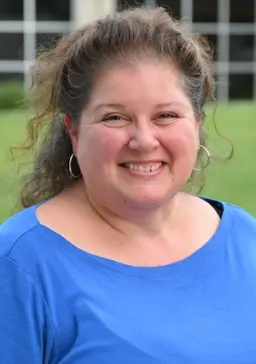Through the Parent Pathways of Northeastern Pennsylvania program, student parents have access to vital resources. On campus, Kristi Lyons, the Program Coordinator, works directly with student parents to connect them to resources on and off campus.

The program is available to parents, including single mothers, single dads, married parents, and other guardians. They serve parents from five counties in Northeastern Pennsylvania, Luzerne, Lackawanna, Wayne, Wyoming, and Susquehanna, who are Pell-eligible and living at or near the poverty level. Services include assistance with childcare, transportation, and academic support to ensure student parents have the tools they need to succeed.
“The priority is to break the intergenerational cycle of poverty through access to education and high-skill trades so that parents may earn family-sustaining livable wages while their children have access to education, service providers, and support,” said Katherine Pohlidal, Director of the Bourger Women with Children Program and a key leader in the development of Parent Pathways.
Launched in 2022 and piloted through the Robin Hood Foundation, the program supports those balancing higher education with parenting responsibilities. It offers a variety of services aimed at helping student parents succeed academically while managing their family obligations.
“Time management is the biggest struggle, trying to spend time with your kid and show them love all while trying to get your schoolwork done,” Amirah Muhammed-Coney, senior business major and mother of one said.
One of student parents’ most significant challenges is managing their school, work, and parenting responsibilities. Their ability to continue their education often relies heavily on their access to reliable childcare and transportation, students say.
“I have learned that transportation and childcare are paramount issues and obstacles to student parents on this campus and in higher education in general. We are hearing a lot that things would be very different as far as scheduling and opportunities,” Lyons said.
For student parents at Misericordia and throughout Northeastern Pennsylvania, these issues can often dictate the success or failure of their academic journey. According to Pohlidal, Parent Pathways of NEPA recognizes these barriers and works to help families overcome them. Whether through direct referrals to childcare services or assistance with transportation, the program aims to reduce these stressors so parents can focus on their education, she said.
One of the program’s challenges is identifying student parents on campus due to changes in the Free Application for Federal Student Aid (FAFSA) form. If student parents would like assistance, the program is flexible depending on the help or services they seek, but students must reach out.
“We have identified about 80 student parents on campus, and they can have as much or as little involvement as they want with the Parent Pathways program. We can be more intensive if some people need that, or if people want somebody to check in with, we can be a light service to them,” Lyons said.
Lyons works directly with student parents to connect them to resources on and off campus. Through the program, student parents can also reach out to her directly for one-on-one support.
“We offer a lounge space on the second floor of Mercy Hall where student parents can find essentials like toiletries, school supplies, and snacks. We’re also here to provide referrals for housing, medical care, and other supportive services,” Lyons said.
Beyond necessities, the program also fosters a sense of community among student parents, who often feel isolated, according to Lyons. Parent Pathways hosted a mixer in September, allowing student parents to meet each other and build connections. She hopes to plan new social events to help these students feel more connected to their school and each other.
“We’ve heard from many parents that they feel like they’re on an island. These events help create a support network that can make a real difference in their college experience,” Lyons said.
The program aims to create long-term change by advocating for policies and reducing barriers for parents seeking higher education.
“We also hope that this model can be replicable and continue to be implemented in neighboring counties as well as serve as a way to evaluate how systems may work to collaborate and support student parents as they access higher education and training,” Pohlidad said.
Parent Pathways is deeply involved in advocacy and policy work. Officials use the data they collect to inform policymakers and service providers about the unique challenges faced by student parents.
“The data and the information we are gathering as we develop this program can serve to inform policymakers, service providers, and institutions of higher education. It will also serve to reduce systemic silos that may have historically existed among these systems, whether intentional or not,” said Pohlidad.
Parent Pathways supports parents at many stages of their educational journey, including those as early as high school. The program assists parents working to obtain their GED before starting college or trade school, offering guidance and resources to help them take the first steps toward higher education and career training.
“So, it’s a little bit different in the model of being a clearinghouse for all other social service agencies that we can refer to while promoting students in higher education,” Lyons said.
Student-parents looking for support should visit Parent Pathways of NEPA at www.parentpathwaysofnepa.org or contact Lyons at 570-262-0382 or by email at klyons@misericordia.edu to learn more about the services available
